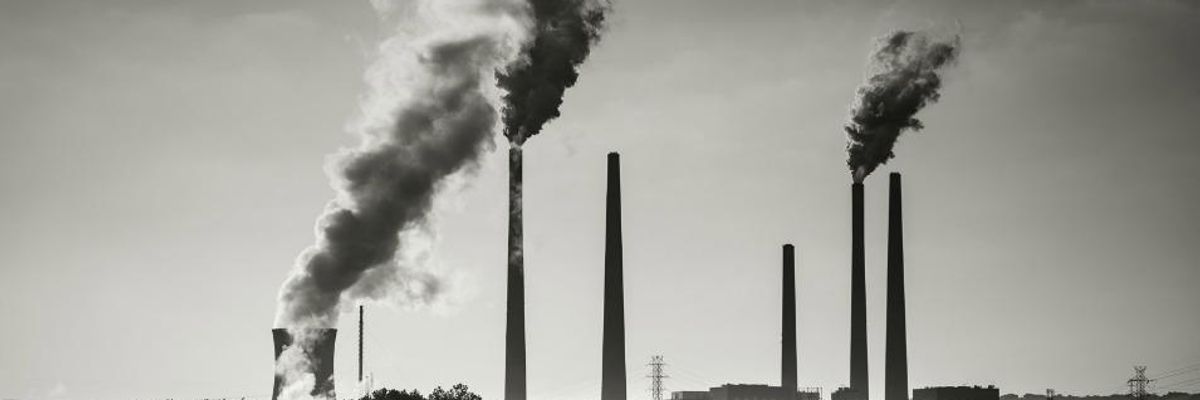Exposing how far corporate polluters will go to undermine state climate and clean energy policies, a new report released Thursday outlines how the American Legislative Exchange Council (ALEC) and its oil and gas allies are working to stop, block, and stall efforts in Virginia to curb greenhouse gas emissions.
The report (pdf) from Sierra Club Virginia Chapter and the Center for Media and Democracy (CMD) charges that "for 40 years, Arlington, Virginia-based ALEC has convened conservative state legislators and corporations to draft 'model legislation' beneficial to ALEC corporate members, including some of Virginia's worst polluters."
"The fact is you simply cannot be serious about reducing carbon pollution and addressing climate change while also supporting ALEC."
--Seth Heald, Sierra Club Virginia Chapter
For example, Dominion Resources, the parent company of Dominion Virginia Power--the largest emitter of carbon-dioxide pollution in Virginia according to its own reports to the Environmental Protection Agency (EPA)--is a member of ALEC's "Energy, Environment and Agriculture Task Force."
And this isn't an isolated strategy.
In fact, the groups say the tactics used in Virginia were drawn from "a nationally driven playbook developed over decades" to protect fossil fuel corporations and their profits in the face of national efforts to stem climate change.
One such effort is the Obama administration's Clean Power Plan (CPP), which sets the nation's first-ever protections against carbon pollution by giving each state a carbon reduction goal to help cut national carbon pollution from power plants by 32 percent from 2005 levels by the year 2030. ALEC has opposed the CPP from the start.
No surprise, then, that in 2016, ALEC-aligned Virginia lawmakers introduced three bills in an effort to impede the state's efforts to comply with the plan.
A side-by-side analysis by CMD and the Sierra Club shows that these bills are copied almost verbatim from "model" bills that "have already been secretly voted on by corporate lobbyists and special interest groups voting as equals with legislators at closed-door ALEC task force meetings."
While this year's bills either already have been or are expected to be vetoed, the Sierra Club and CMD say "odds are high that they will be introduced again next session, and if they do not succeed, the session after that."
Furthermore, on the last day of the General Assembly session, a "poison pill" was added into the state budget that prohibits the governor from funding any further work on the Clean Power Plan until the U.S. Supreme Court lifts its stay. Democratic Gov. Terry McAuliffe could use his line-item veto authority to strike this amendment from the budget--an outcome for which environmentalists are advocating.
"I was pleased that during the 2016 General Assembly session we were able--at least so far--to fend off ALEC's attempt to derail Virginia's plan to curb emissions and comply with the Clean Power Plan," said Virginia Delegate Rip Sullivan, a Democrat.
"It is disappointing and troubling, though, that ALEC-inspired HB2 and SB21 passed the General Assembly--thankfully not by veto-proof majorities," he added. "Virginia should be leading the way on clean energy, but sadly, we lag far behind."
In addition to the bills proposed in Virginia, ALEC-approved legislation includes measures that: disallow essential pollution reduction tools, such as promoting energy efficiency; block the use of state funds to comply with the requirements of the Clean Power Plan; and establish a slush fund financed by gifts from corporations and individuals to be used to pay for states to litigate against the Clean Power Plan and other federal environmental protections.
"Despite the recent Supreme Court decision to stay the Clean Power Plan, many states, including Virginia, continue to develop plans to meet their targets for carbon emissions reductions," the CMD/Sierra Club report points out. "This progress is critical to fulfilling the United States' commitment to reduce carbon pollution under the Paris international climate agreement, and will continue to require defense against ALEC and the polluters who put profits over people in their policy advocacy."
And it will require continued pressure on corporate funders to withdraw their backing for ALEC, as many have already done. After all, said Seth Heald, chair of the Sierra Club Virginia Chapter, "the fact is you simply cannot be serious about reducing carbon pollution and addressing climate change while also supporting ALEC."

